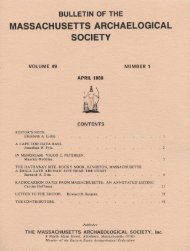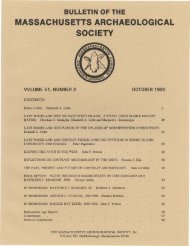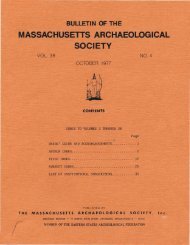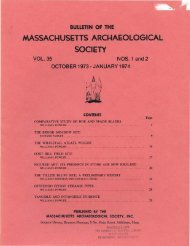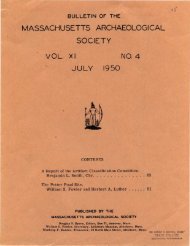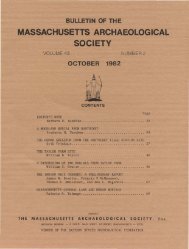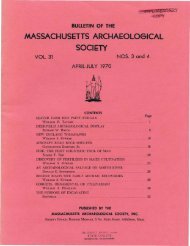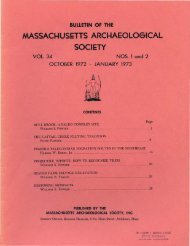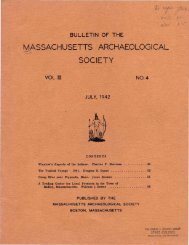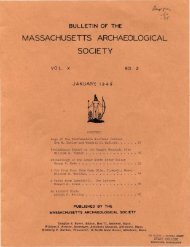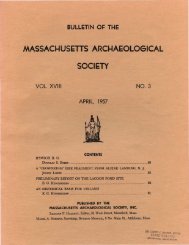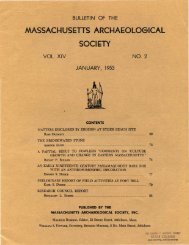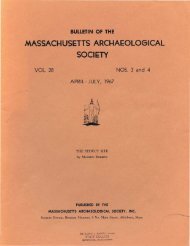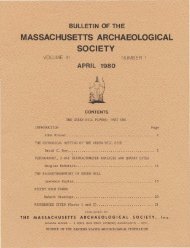Bulletin of the Massachusetts Archaeological Society, Vol. 54, No. 1 ...
Bulletin of the Massachusetts Archaeological Society, Vol. 54, No. 1 ...
Bulletin of the Massachusetts Archaeological Society, Vol. 54, No. 1 ...
Create successful ePaper yourself
Turn your PDF publications into a flip-book with our unique Google optimized e-Paper software.
BULLETIN OF THE MASSACHUSETTS ARCHAEOLOGICAL SOCIETY, VOLUME <strong>54</strong>(1), 1993 41<br />
The English thought <strong>the</strong>y had killed Epanow as<br />
he swam. While trying to recover his supposed<br />
corpse, <strong>the</strong> Master <strong>of</strong> <strong>the</strong> ship and many <strong>of</strong> <strong>the</strong><br />
crew were wounded (Gorges 1622; Smith 1895:<br />
701; 1986,ii:403). The English, including Captain<br />
Nicholas Hobson, returned to England with<br />
a false report that Epanow and several <strong>of</strong> his<br />
tribe had been killed (Purchas 1905,xix: 132).<br />
After his first conference with Epanow<br />
in 1619, Dermer sailed to Virginia for <strong>the</strong><br />
winter without Squanto (Purchas 1905,xix: 129<br />
134).<br />
Edward Winslow and Bradford were told<br />
by Samoset that <strong>the</strong> Nausets slew three <strong>of</strong> Sir<br />
Ferdinando Gorges' employees in 1620. Two<br />
o<strong>the</strong>r Englishmen just barely escaped by fleeing<br />
to Monhegan (Mourt 1622:452). Some historians<br />
associate Dermer with <strong>the</strong> 1620 battle,<br />
but <strong>the</strong> year is wrong, and, more importantly,<br />
Dermer wrote that <strong>the</strong> Nauseuk in 1619<br />
attempted to kill his men, but failed, and no one<br />
had to flee to Monhegan after Dermer's fight.<br />
In 1620 Dermer returned to New<br />
England according to Gorges (1658:26), stopping<br />
at Nautican or Nantucket, and Martha's<br />
Vineyard, where Epanow spoke about his escape<br />
in English and laughed. Then, after questioning<br />
Dermer about Gorges' intent, Epanow lost faith,<br />
References Cited<br />
and he and his companions attacked Dermer and<br />
his crew. Dermer received fourteen or fifteen<br />
wounds (Purchas 1905,xix:279). All <strong>of</strong><br />
Dermer's men were slain except for one who<br />
had stayed in <strong>the</strong> boat. While Dermer tried to<br />
get into <strong>the</strong> boat, Epanow and company would<br />
have cut <strong>of</strong>f Dermer's head upon a small cabin<br />
in <strong>the</strong> boat, if Dermer's man had not rescued<br />
Dermer with a sword and escaped with him to<br />
Virginia, where Dermer died from his wounds<br />
or from a disease (Bradford 1912,i:209; Purchas<br />
1905,xix:279; Winslow 1624:593),<br />
The Pilgrims wrote (Mourt 1622:452<br />
455) that Squanto was <strong>the</strong> only survivor <strong>of</strong> <strong>the</strong><br />
plague <strong>of</strong> 1616-1619 to·have been a native <strong>of</strong><br />
Patuxet. Both Bradford and Winslow describe<br />
a male relative <strong>of</strong> Squanto who was alive in<br />
1622 (Bradford 1912,i:252,253; Winslow 1624:<br />
523,524), who may not have been from Patuxet.<br />
Squanto met <strong>the</strong> Pilgrims in <strong>the</strong> spring <strong>of</strong><br />
1621 and provided invaluable guide services to<br />
<strong>the</strong> newcomers (see Mourt 1622; see Bradford<br />
1912). He died <strong>of</strong> sickness at Pleasant Bay on<br />
Cape Cod in 1622 (Bradford 1912:283). Frederick<br />
J. Dockstader wrote that Tisquantum<br />
means <strong>the</strong> "door or entrance" (Dockstader<br />
1977). Indeed, Squanto was <strong>the</strong> door through<br />
which <strong>the</strong> English entered New England.<br />
Baxter, James Phinney, editor<br />
1890 Memoir <strong>of</strong> Sir Ferdinando Gorges. In Publications <strong>of</strong><strong>the</strong> Prince <strong>Society</strong>, vol. 15. John Wilson and Son,<br />
Boston.<br />
Bradford, William<br />
1912 History <strong>of</strong>Plymouth Plantation 1620-1647. 2 vols. The <strong>Massachusetts</strong> Historical <strong>Society</strong>. Houghton<br />
Mifflin, Boston.<br />
Ceci, Lynn<br />
1975 Fish Fertilizer: A Native <strong>No</strong>rth American Practice? Science 118(4183):26-30.<br />
Dockstader, Frederick J.<br />
1977 Great <strong>No</strong>rth American Indians.' Pr<strong>of</strong>iles in Life and Leadership. Van <strong>No</strong>strand Reinhold, New<br />
York.<br />
Gorges, Sir Ferdinando<br />
1622 A Briefe Relation. In Publications <strong>of</strong> <strong>the</strong> Prince <strong>Society</strong>, vol. 15, James Phinney Baxter, editor<br />
[1890]. John Wilson and Son, Boston.



